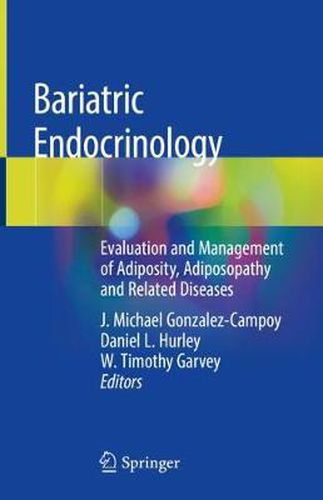Readings Newsletter
Become a Readings Member to make your shopping experience even easier.
Sign in or sign up for free!
You’re not far away from qualifying for FREE standard shipping within Australia
You’ve qualified for FREE standard shipping within Australia
The cart is loading…






This unique book - the first ever on bariatric endocrinology - is a comprehensive endocrine and metabolism approach to the diseases that result from excess fat mass accumulation and adipose tissue dysfunction. It takes an approach that places adipose tissue at the center of the clinical approach to patients, as opposed to the complications of adipose tissue accumulation and dysfunction, which has been the dominant approach to date.
Initial chapters include discussion of adipose tissue physiology and pathophysiology (adiposopathy), hormonal, central nervous system, and gut microbiome regulation of energy balance and stores, and primary and secondary causes of adipose tissue weight gain. Subsequent chapters cover the evaluation and treatment of dyslipidemia, insulin resistance and hyperglycemic states, hypertension, neoplasia, and gonadal function in men and women. Management strategies, such as nutrition, physical activity, pharmacotherapy, and bariatric procedures, round out the presentation. Each chapter is bookended by bullet-pointed clinical pearls at the beginning and a full reading list at the end.
Written and edited by experts in the field of endocrinology and obesity management, Bariatric Endocrinology redefines practice to focus not just on weight loss as measured in pounds lost, but on adipose tissue mass and pathology, decreasing fat mass for adiposity-related diseases and returning adipose tissue to normal function.
$9.00 standard shipping within Australia
FREE standard shipping within Australia for orders over $100.00
Express & International shipping calculated at checkout
This unique book - the first ever on bariatric endocrinology - is a comprehensive endocrine and metabolism approach to the diseases that result from excess fat mass accumulation and adipose tissue dysfunction. It takes an approach that places adipose tissue at the center of the clinical approach to patients, as opposed to the complications of adipose tissue accumulation and dysfunction, which has been the dominant approach to date.
Initial chapters include discussion of adipose tissue physiology and pathophysiology (adiposopathy), hormonal, central nervous system, and gut microbiome regulation of energy balance and stores, and primary and secondary causes of adipose tissue weight gain. Subsequent chapters cover the evaluation and treatment of dyslipidemia, insulin resistance and hyperglycemic states, hypertension, neoplasia, and gonadal function in men and women. Management strategies, such as nutrition, physical activity, pharmacotherapy, and bariatric procedures, round out the presentation. Each chapter is bookended by bullet-pointed clinical pearls at the beginning and a full reading list at the end.
Written and edited by experts in the field of endocrinology and obesity management, Bariatric Endocrinology redefines practice to focus not just on weight loss as measured in pounds lost, but on adipose tissue mass and pathology, decreasing fat mass for adiposity-related diseases and returning adipose tissue to normal function.